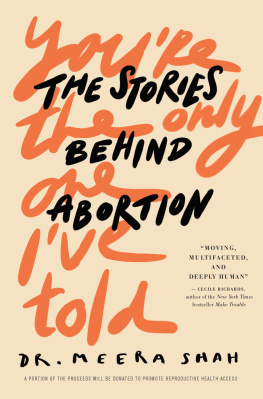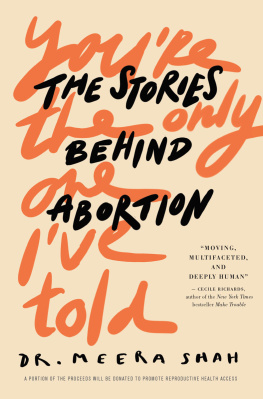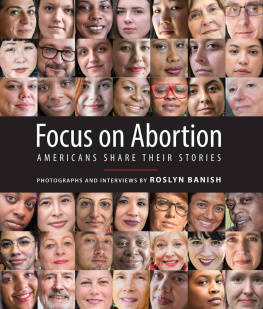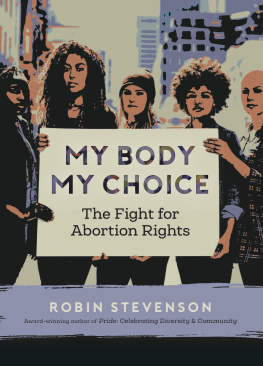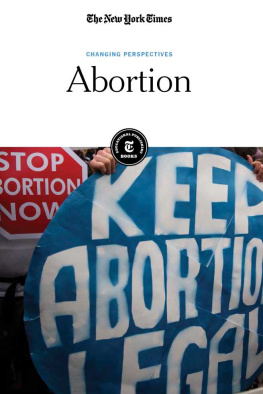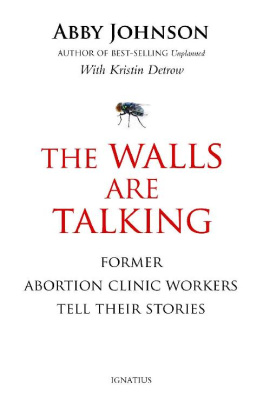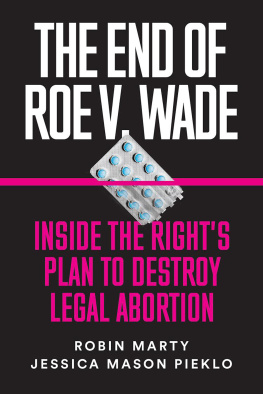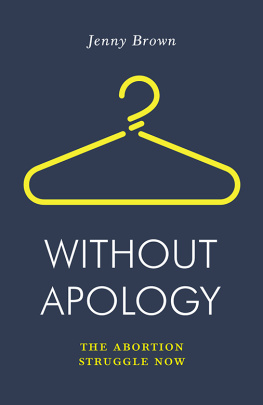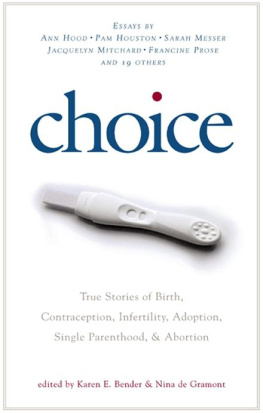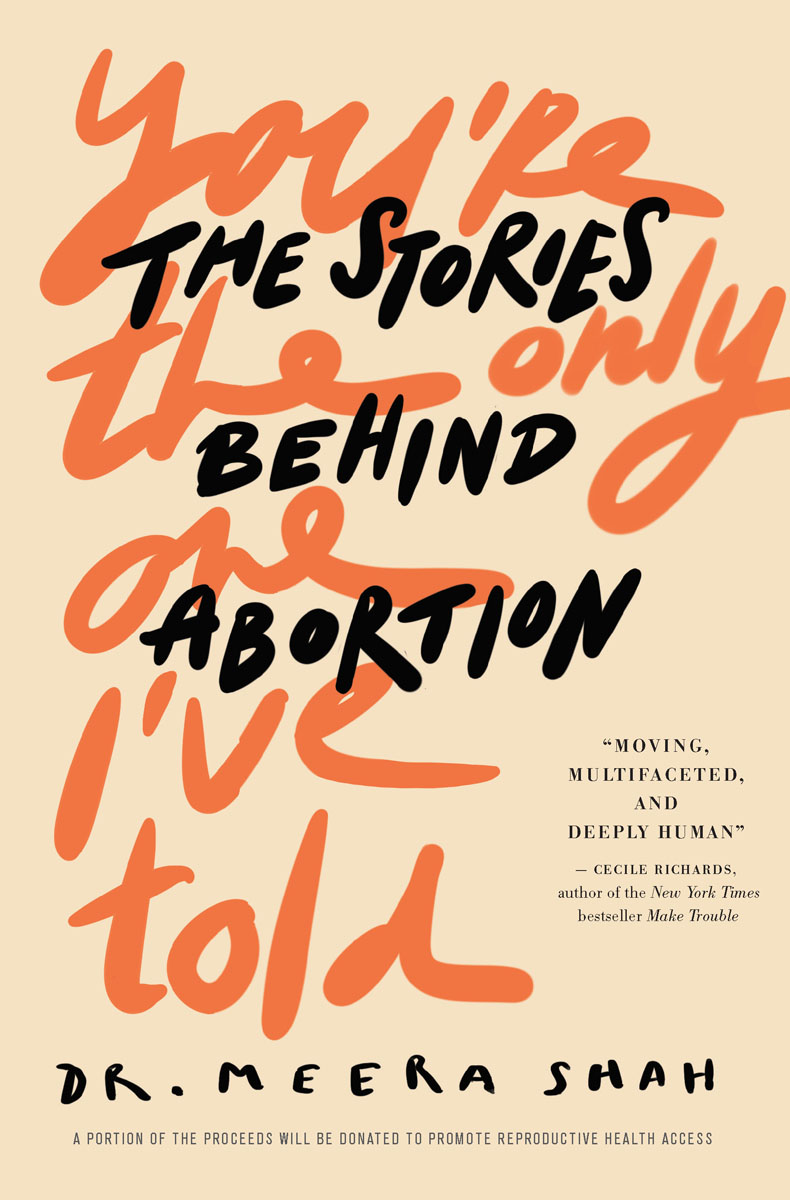
For a long time, when people asked Dr. Meera Shah what she did, she would tell them she was a doctor and leave it at that. But over the last few years, Shah decided it was time to be direct. Im an abortion provider, she will now say. And an interesting thing started to happen each time she met someone new. One by one, people would confideat barbecues, at jury duty, in the middle of the greeting card aisle at Targetthat in fact theyd had an abortion themselves. And the refrain was often the same: Youre the only one Ive told. This book collects those stories as theyve been told to Shah to humanize abortion and to combat myths that persist in the discourse that surrounds it. An intentionally wide range of ages, races, socioeconomic factors, and experiences shows that abortion always occurs in a unique context. Today, a healthcare issue thats so precious and foundational to reproductive, social, and economic freedom for millions of people is exploited by politicians who lack understanding or compassion about the context in which abortion occurs. Stories have power to break down stigmas and help us to empathize with those whose experiences are unlike our own. They can also help us find community and a shared sense of camaraderie over experiences just like ours. Youre the Only One Ive Told will do both.
To my parents, who taught me to always look beyond myself and to do the right thing
Copyright 2020 by Meera Shah
All rights reserved
First edition
Published by Chicago Review Press Incorporated
814 North Franklin Street
Chicago, Illinois 60610
ISBN 978-1-64160-363-8
Some names and identifying details have been changed to protect the privacy of individuals.
Library of Congress Control Number: 2020939551
Interior design: Jonathan Hahn
Printed in the United States of America
5 4 3 2 1
Praise for Youre the Only One Ive Told
Youre the Only One Ive Told goes far beyond the headlines and political rhetoric to paint a moving, multifaceted, and deeply human picture of abortion. Dr. Meera Shah blends medical expertise and facts with personal accounts, resulting in a book that is as eye-opening as it is compelling.
C ECILE R ICHARDS , author of Make Trouble
Through these compelling stories, Dr. Shah reveals the determination and the deliberations of people who seek abortion care. This book shows, as my research has confirmed, that people make the decision to end a pregnancy balancing their own responsibilities and visions for the future. With Dr. Shah as our guide, we see the compassion and thoughtfulness of people who dedicate their careers to providing abortions.
D IANA G REENE F OSTER , P H D, author of The Turnaway Study
To declare I own my body is revolutionary. To say I count is revolutionary. We do that by sharing our stories. And when our stories come together they create a subversive wave that sweeps away shame and silence. In this vital book, Dr. Meera Shah gifts her confidantsthe storytellersand usthe readerwith that power. Read this book.
M ONA E LTAHAWY , author of The Seven Necessary Sins for Women and Girls
Contents
INTRODUCTION
There is no such thing as a single-issue struggle because we do not live single-issue lives.
A UDRE L ORDE
I was walking down the greeting card aisle of a Target in South Carolina, texting and not really paying attention, when I bumped into her. With her gold-rimmed spectacles, wrinkles around her lips, and fluffy white hair, she looked like Mrs. Claus, or maybe even Betty White. She had a warm expression, and she immediately apologized, even though I had bumped into her. In the South, sometimes it seems like everyone is reflexively apologetic. I glanced down at her shopping cart: a bottle of yellow Gatorade, a few pairs of oversized mens boxer shorts, and piles of unscented Dove soapmaybe fifty bars of the stuff. A peculiar collection of items.
I put my phone away and returned to my original task. The store would be closing soon, so I had to be quick. I was visiting my parents over a particularly toasty summer weekend in my small hometown, and, with very little to do, I used any excuse I could find to get in a car and drive to the air-conditioned Target.
That day, my mission was to buy a birthday card for a three-year-old. Since he couldnt yet read, I wanted to find a card that played a tune when opened. He would love that.
Are you a nurse? the soap woman asked in her southern drawl.
A bit startled, I responded, Im a doctor. Why do you ask? Again, I had to remind myself that I was back in the South, where people like to engage with complete strangers. On my way to the store, my parents neighbor had stopped his lawn mower just to smile and wave at me as I drove by. I had never met him before.
You have a stethoscope, she said.
I looked down at my bag, and there it was: my black-and-silver stethoscope, peering out over the edge. I had forgotten to remove it while packing for this trip.
If she hadnt seemed so warm and friendly, I would have chastised her for gendering my profession. This happens to me all the time: a man with a stethoscope is a doctor; a woman with a stethoscope is a nurse. Instead, I smiled at her and turned back to the card selection. I found one featuring Thomas the Tank Engine that made choo choo noises. The woman was still there next to me, looking at bereavement cards. What kind of doctor are you? she asked.
At that point in my life, this question was a tricky one for me. I still hadnt figured out what to say. As a doctor who provides abortion care and who specializes in sexual and reproductive health, I would often pause when asked what I do, especially when I traveled outside of my New York City home. Im acutely aware of how abortion is perceived in different parts of the country.
Im a family medicine doctor, and I specialize in sexual and reproductive health, I finally said. It sounded like a comprehensive answer, yet didnt give away too many details that could be conversation stoppers. I had just started becoming more vocal about issues that were important to my work and values, and among the many services I provided, abortion was one of the most important ones.
At that point, we were blocking the aisle and had to move to one side so that others could pass.
She wasnt satisfied with my answer, though. So what does that mean? Do you deliver babies?
Now this made me pause. At that time, I rarely disclosed that I provided abortion care. After the 2016 presidential election, it became
South Carolina is part of the Bible Beltso the absurdity of these laws makes sense to me in that context. Conservative Christians within the antiabortion movement would do anything to prevent people from having abortions, in the name of religion. Violence against physicians like me who provide abortion care is a very real concern. So much so that it has contributed to the significant shortage of those who provide abortion care. We face a higher rate of harassment and violence, especially in states with more restrictive legislation. I was alarmed, to say the least.
And lets never forget Dr. David Gunn, Dr. Barnett Slepian, and Dr. George Tillerall murdered for doing the work of helping patients that they cared so deeply about.
While many of my colleagues have been able to live and practice in more conservative areas without major problems, most exercise caution when disclosing the nature of their work. Many feel too afraid to disclose their abortion work at all. And most family medicine and ob-gyn doctors choose not to provide abortion care altogetherthe fear is just too great, too few residency programs provide training, or the stigma prevents students and trainees from getting accurate enough information about abortion care to appreciate its value.
Next page
